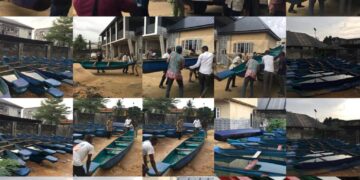The Niger Delta Development Commission (NDDC) has distributed over 30 boats to riverine communities across Cross River State. This initiative, described by the Commissioner representing Cross River State on the NDDC Board, aims to mitigate the significant impact of recent severe flooding, particularly on the livelihoods of those in rural areas.
Speaking to journalists in Calabar, Otuekong Orok Duke noted that the distribution of boats forms part of the relief efforts previously rolled out to support flood-displaced residents. He explained, “These boats are part of the palliatives intended for flood victims, which should have arrived three months ago. Due to delays, I had to insist on securing the Cross River State allocation, and while we are still awaiting the cassava processing machines, these boats finally arrived about four months ago. Though limited to just 30 units, we felt it necessary to distribute them to the beneficiaries without further delay.”
The commissioner highlighted that although flood damage was widespread, the limited number of boats available has been prioritized for specific communities in the southern region. “We thought it prudent to ensure that riverine communities in the south, such as Esuk Atu, Obufa Esuk Orok, Idang, Anantigha/Jebbs, Esiere Ebom, Duke Town, and Lemna Beach in Calabar Municipality, were prioritized. Additionally, 10 boats were allocated to Adiabo and Odukpani, covering Adiabo and Ikot Offiong Beaches,” he clarified.
He added that the distribution of the boats comes at a fitting time. “This is just a token from the NDDC’s palliatives, and with election campaigns now in full swing, we saw it as an opportune moment to share these resources. We are still awaiting the cassava processing machines, but this gesture should offer some relief in the interim,” he remarked.
When asked if Cross River State had benefited adequately from NDDC’s projects and initiatives, Orok Duke responded candidly: “For a fair share, you must first be informed of the resources and developments underway. For us, it’s still a work in progress. The depth of damage over the years requires thorough examination and gradual redress.”
Duke also highlighted the challenges in executing the NDDC’s budget, citing delays and funding limitations. “Our budget for the year stands at around 1.9 trillion, yet a critical loan of 1 trillion, approved by the president, still awaits the board’s sanction. Without an approved budget, we’ve relied on up to 50% of the previous year’s budget for operational costs, such as staff salaries. This limits our capacity to fully assess the damage and address Cross River’s developmental needs,” he explained.
Reflecting on his tenure, Duke shared his hopes for Cross River’s progress within the NDDC framework. “As we approach one year in office on the 26th of November, we remain hopeful that new remedial measures will yield tangible benefits, ensuring that Cross River receives its rightful share and improves its standing within the Commission. We look forward to the progress that fair representation will bring,” he concluded.
Recently, the NDDC has also distributed streetlights and other essential resources to communities. The Commission has committed itself to transparent and equitable project implementation, a shift from previous instances where distribution lacked due process and accountability.











